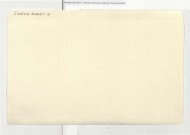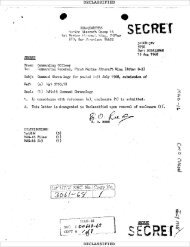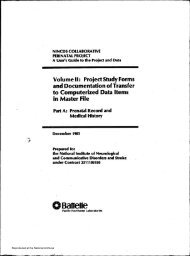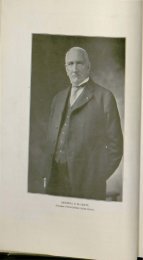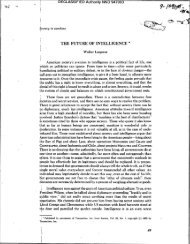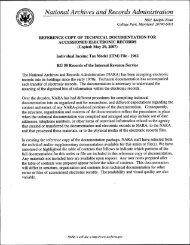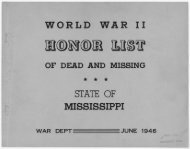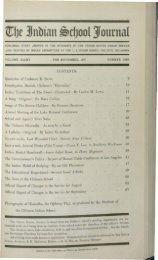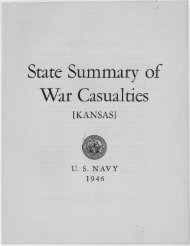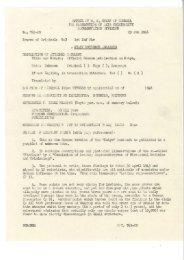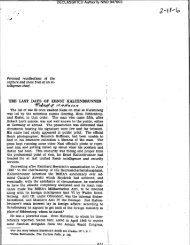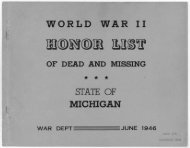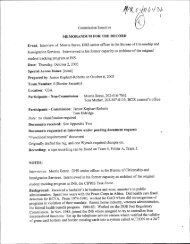Part IV. C. 7. b. - National Archives and Records Administration
Part IV. C. 7. b. - National Archives and Records Administration
Part IV. C. 7. b. - National Archives and Records Administration
Create successful ePaper yourself
Turn your PDF publications into a flip-book with our unique Google optimized e-Paper software.
Declassified per Executive Order 13526, Section 3.3<br />
NND Project Number: NND 63316. By: NWD Date: 2011<br />
TOP SECRET - Sensitive<br />
In a similar fashion Bundy developed his arguments against a major<br />
increase in U.S. troop strength in the South <strong>and</strong> urged the President<br />
not to take any nevr diplomatic initiatives for the present . But the<br />
appeal of Bundy ' s analysis for the President must surely have been its<br />
finale in which Bundy, acutely avrare of the F:esident ' s political<br />
sensitivities , cast his arguments in the context of the forthcoming<br />
1968 Presidential elections. Here is how he presented the case:<br />
There is one further argument against major escalation<br />
i n 1967 <strong>and</strong> 1968 "Thich is 'Ivorth stating separately, because<br />
on the surface it seems cynically political. It is that<br />
Hanoi i s going to do everything it possibly can to keep its<br />
position intact until after our 1968 elections . Given their<br />
history, they are bound to hold out for a possible U.S. shift<br />
in 1969 -- that's Ivhat they did against the French, <strong>and</strong> they<br />
got most of vThat they wanted when Mendes took po'\ver . Having<br />
held on so long this time , <strong>and</strong> having nothing much left to<br />
l ose -- compared to the chance of victory -- they are bound to<br />
keep on fighting . Since only atornic bomb s could really knock<br />
them out (an invasion of North Vietnam would not do it in<br />
tl'TO years, <strong>and</strong> is of course ruled out on other grounds) , they<br />
have it in their p01',ver to "prove" that military escalation<br />
does not bring peace - - at least over the next two years .<br />
They vTill surely do just that. However much they may be<br />
hurting, they are not going to do us any favors before<br />
November 1968 . (And since this was drafted, they have been<br />
publicly advised by Walter Lippmann to wait for the Republicans<br />
as if they needed the advice <strong>and</strong> as if it was his place to give<br />
it! )<br />
It follo,vs that escalation '\vill not bring visible victory<br />
over Hanoi before the election. Therefore the election will<br />
have to be fought by the <strong>Administration</strong> on other grounds .<br />
I think those other grounds are clear <strong>and</strong> i mportant, <strong>and</strong> that<br />
t hey will be ob scured if our policy is thought to be one of<br />
increasing -- <strong>and</strong> ineffective -- military pressure.<br />
If vTe assume that the war will still be going on in<br />
November 1968, <strong>and</strong> that Hanoi Ivill not give us the pleasure<br />
of consenting to negotiations sometime before then what we<br />
must plan to offer as a defense of <strong>Administration</strong> policy is<br />
not victory over Hanoi, but growing success -- <strong>and</strong> selfreliance<br />
-- in the South. This we can do , with luck, <strong>and</strong> on<br />
this side ,)f the parallel the Vietnamese authorities should be<br />
prepared to help us out (though of course the VC will do their<br />
damnedest against us.) Large parts of Westy ' s speech (if not<br />
quite all of it) i.,rere lv-holly consistent with this line of argument<br />
. 111<br />
28 TOP SECRET - Sensitive



